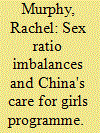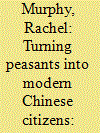| Srl | Item |
| 1 |
ID:
077173


|
|
|
| 2 |
ID:
141099


|
|
|
|
|
| Summary/Abstract |
In China, owing to many parents' preference for sons, the sex ratio at birth (SRB) is imbalanced. During the 2000s, SRB fluctuated at around 120 boys to 100 girls. In the early 2000s, to tackle the SRB imbalance, the Chinese government launched a series of policy measures under the banner of “care for girls.” This article presents a case study of the Care for Girls programme in order to explore how the construction of SRB as a social problem has led to the formulation and adoption of one set of policy responses to the exclusion of others. The analysis shows that the imbalanced SRB has been attributed to rural peoples' cultural and economic deficiencies rather than cast in terms of a need to recognize the inherent worth of girls or a need to ensure that all rural families have entitlements to basic social welfare. This construction of SRB has enabled the Party-state to advance a “care as control” policy response which comprises ideological education, conditional material benefits and sanctions, and which sidesteps the institutional underpinnings of the problem.
|
|
|
|
|
|
|
|
|
|
|
|
|
|
|
|
| 3 |
ID:
052285


|
|
|
|
|
| Publication |
Mar 2004.
|
| Summary/Abstract |
The all-embracing discourse of population quality (suzhi) is put to work through rural primary schools in ways that help state institutions implement policies such as accelerating demographic transition, restructuring the education system, professionalizing labour markets, promoting agricultural skills training, instituting economic liberalism and carrying out patriotic education. Suzhi discourse facilitates policy implementation in four ways. First, it imbues disparate policies with seeming coherence. Secondly, by articulating a diverse set of policies through suzhi discourse, including state retreat from welfare provisioning, state institutions can be seen to be working to improve people's well-being. Thirdly, in making people responsible for raising their own quality, the need to improve suzhi is an explanation and a prescription when individuals are adversely affected by policies. Finally, suzhi discourse encourages individuals to regulate their conduct in accordance with the political drift of society. By enfolding suzhi norms into identity formation, the education system shapes each individual's ongoing process of "becoming" in ways that parallel the nation's modernization, thereby reducing the costs of policy enforcement.
|
|
|
|
|
|
|
|
|
|
|
|
|
|
|
|